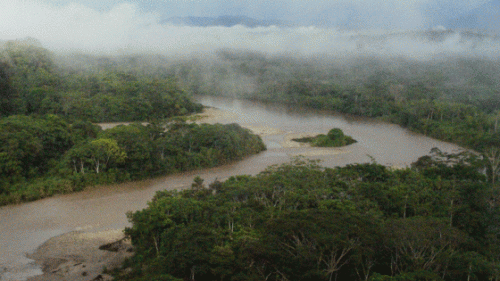Leading the battle to protect the Amazon

England's wettest year on record. Severe heat waves in Russia. Droughts in the US. The past year has been characterised by extreme weather across the world. Protecting the Amazon rainforest – one of the largest carbon reservoirs on our planet – is critical to helping regulate global climate patterns. Its destruction releases the stored carbon into the atmosphere as 'greenhouse gas', which contributes to climate change.
"The approach to reducing deforestation involves a combination of sophisticated monitoring systems, strong policy, and lots of command and control," said Francisco Oliveira Filho. As a director at the Brazilian Government's Ministry of the Environment, Filho is responsible for overseeing the strategy to reduce illegal deforestation of the Amazon. He leads a team of 28 staff in implementing an action plan that has global consequences.
As testament to their efforts, the Brazilian Government recently announced that deforestation in the Amazon has been reduced to a record low of 4,656km2 in 2012, in line with its National Policy on Climate Change. But a continued improvement to meet the commitment of an 80% reduction from 2004 still presents an enormous challenge.
"Our integrated approach has allowed us to achieve a really impressive reduction in deforestation. We are very close to meeting Brazil's commitments, but achieving the last small reduction is the hardest," said Filho.
"We receive daily information on deforestation from the sophisticated monitoring systems of the Brazilian National Institute for Space Research (INPE)," he added. "We have rangers, federal police, state police and the army all working together, going straight to the places where deforestation is going on. Violators are fined, jailed, or have their machinery confiscated."
The pressure on landowners to clear more of the Amazon's trees for agriculture is increasing from all sides. In other countries droughts and flooding that have been linked to climate change have caused widespread crop failures. This, combined with a rising world population, is leading to higher global food prices. Such financial incentives, coupled with a weakening of Brazilian laws, encourage landowners in the Amazon to break the law in order to make a living.
Filho previously worked as an Environmental Analyst, and later Deputy Director of Environmental Protection with the Brazilian Environment Agency. A sabbatical gave him the opportunity to undertake the University of Cambridge's MPhil in Conservation Leadership programme. "I knew I had to improve my skills in leadership, and I wanted to see what I could learn," he said. His return to Cambridge last month gave him the opportunity to describe his work to the current cohort of students taking the MPhil. Programme Director Professor Nigel Leader-Williams said, "Francisco exemplifies the importance of the people we train. He's got the future of the Amazon in his hands."
The University of Cambridge's innovative programme is run in partnership with nine Cambridge-based conservation organisations and networks, which together make up the Cambridge Conservation Initiative. Its aim is to train the next generation of conservation leaders, equipping them with the research, management, leadership and networking skills needed to enhance conservation and combat the worldwide loss of biodiversity.
"During the Conservation Leadership programme I learnt a lot about scientific issues like climate change that I need for my work," said Filho. "But I also learnt about how to communicate effectively, how to innovate, and how to engage people – skills that are very important when you want to be a leader. Discussions with classmates from all over the world, with different skills and backgrounds, has given me a new perspective on many conservation issues."
Returning to Brazil, Filho was immediately able to use the skills he had developed at Cambridge. "I now believe that no-one can succeed at conservation alone – we need to work as a team. A new forest law has just been approved, which combines environmental, economic and social issues," he said. "We're trying to show that it's possible to improve and increase agricultural and cattle production without removing any more trees from the forest."
"At Cambridge I learnt that working cooperatively sometimes takes more time. But when everyone is marching in the same direction you can achieve something much better. The results we've achieved in the Amazon have only been possible through working together."
Provided by University of Cambridge


















